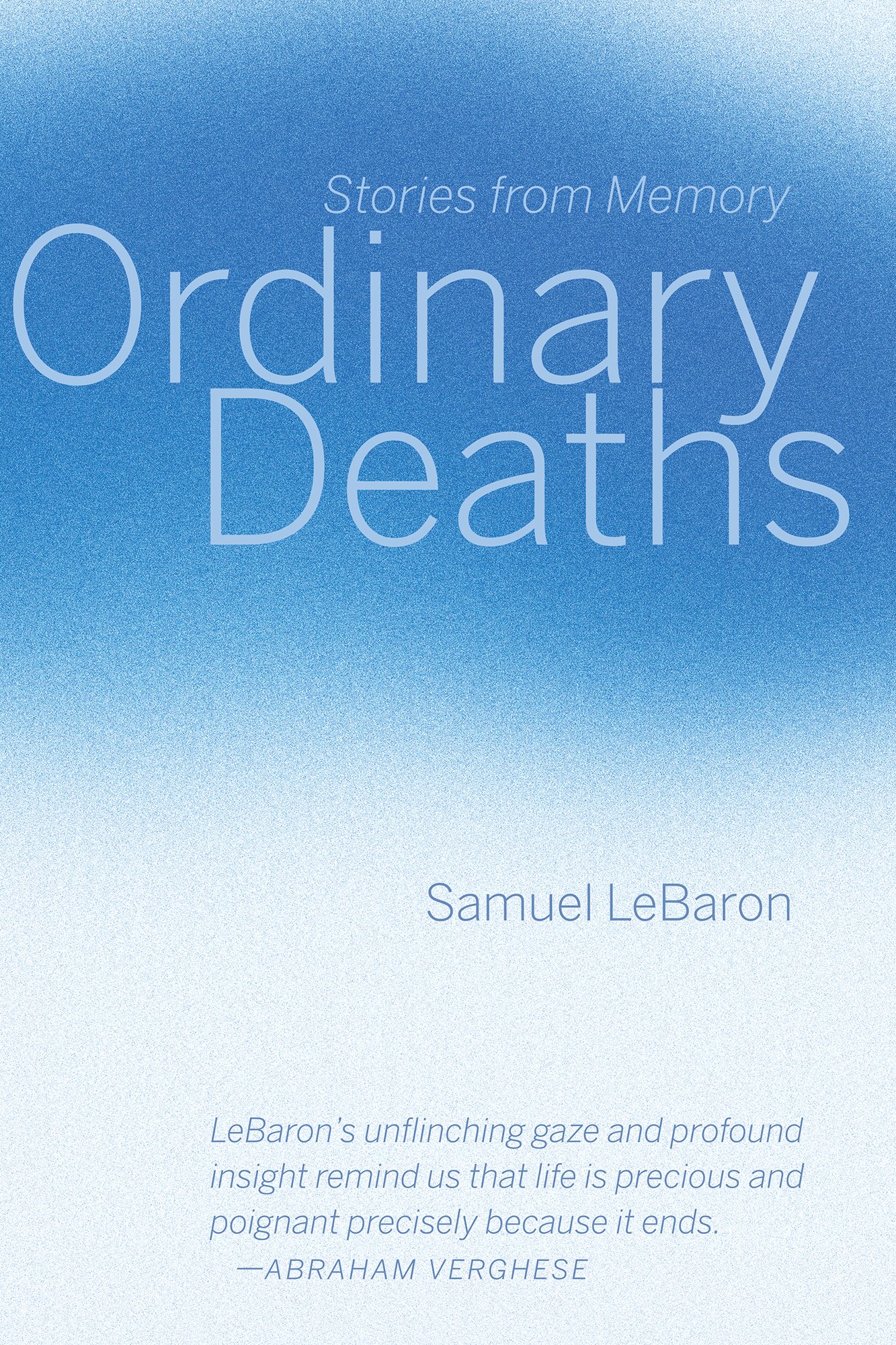Dr. Samuel LeBaron is Professor Emeritus of Medicine at the Stanford University Medical Center. He has a doctorate in clinical psychology and was an early pioneer on managing pain and suffering. His short story “Bling” appeared in the Spring 2020 Intima: A Journal of Narrative Medicine. He lives both near San Francisco, CA, and in Victoria, BC.
A goldfish dies. A little boy tries to understand the mystery of life and death by trying to drown a cat. A dead beloved Aunt is kissed, dressed up and buried. A friend is killed in a car accident.
So begins Ordinary Deaths: Stories From Memory by Samuel LeBaron, a physician and psychologist. According to Aldous Huxley, “Every man’s memory is his private literature,” and this memoir is an example of that, comprised of a sampling of stories from LeBaron’s extensive personal library of remembrances and meditations on the end of life. The stories remind us of an inexorable truth: All living things — pets, farm animals, relatives and friends and human beings — eventually die.
The book, which was recently published by the University of Alberta Press, examines this truth without the drama often accompanying such writing. Death is not a heroic journey, a metaphorical “war” against fatal illness. It is, as the title states, ordinary. Although we are biologically programmed to focus on survival, to contemplate the fact of death runs counter to our youth-oriented and death-denying culture. LeBaron urges us to not consider death the enemy of life but rather its counterpart.
He introduces us to the point quickly. A journalist contacts LeBaron to interview him about his articles on his dying patients and their families. LeBaron, who is Professor Emeritus of Medicine at the Stanford University Medical Center, was an early pioneer on managing pain and suffering and has been a witness at many life and death encounters. Despite his clinical focus and a lifetime’s worth of experience in this area, the interview provides an epiphany: LeBaron realizes, for the first time, that the articles made him think about his own death. Indeed, the book is grounded in the ancient tradition of memento mori, the Latin phrase that means “Remember that you must die.”
The book’s tone reminded me of a passage in Michael Harrington’s wonderful memoir The Long Distance Runner: An Autobiography (Harry Holt, 1988). Harrington, an American democratic socialist and self-described “pious apostate,” was facing his own death by cancer. In contemplating imminent death, Harrington wanted to avoid the “clichés” so common in autobiographies of dying memoirists. Instead, he wanted to face death with equanimity, with an understanding that death is ordinary, and if there is any lesson to be learned, that is it. LeBaron, too, comes to that conclusion and recounts that as a young adult “…I came to fear death’s unknown regions and its losses.” Later in life, he comes to a different way of thinking, realizing “Death was integral to life, and as ordinary as waking and sleeping.”
Through LeBaron’s stories and the filter of his imagination, we witness his experiences as psychologist, physician and person. His clinical testimony makes us reflect: We may not want to look at death, but we can’t look away from it either. Our fascination with the death of others is often accompanied by the denial of our own death.
In a scene from the television series “The Sopranos,” psychiatrist Jennifer Melfi, played by actress Lorraine Bracco, muses “That’s the mystery, isn’t it...why we’re given the questionable gift of knowing that we’re gonna die.” LeBaron’s aim, therefore, is to demystify the question of death as he reflects upon the mysteries and obligations of life. He deftly combines multiple ways of knowing and telling: memory, stories, magical realism, myth, science, religion and lessons learned from growing up in rural Alberta drive his narratives. The clinician, whose short story “Bling” was published in the Spring 2020 issue of Intima, understands the power of words and uses different “languages of death” to help those of us who come from different traditions and belief systems, to comprehend the shared lessons and obligations of life and death.
One of the personal moments that stands out is when he tells the origin story of his first name. Named for his grandfather, his mother tells him Samuel means “Called of God.”
She says: “I want you to always listen to the voice of God. If you hear it call to you, you can follow in
the path of the prophet and become a great man like your grandpa.”
Samuel the prophet is a model for how to attend to the voices within us that suggest a wise and righteous path. Such passages help us to understand better how ancient myths and stories serve as guides through the unknown.
But the book is more than a memoir of how to face death: Ordinary Deaths is about how to face life. LeBaron quotes Mark Twain: “The fear of death follows the fear of life. A man who lives fully is prepared to die at any time.” We are creatures who have the burdensome gift of knowing we are going to die. But in denying death, in looking the other way, we are in a sense refusing to live life fully. And how we face the deaths of others is a preview of how we will experience our own dying. In this book, the death of a goldfish to young Samuel has as much emotional impact as the death of a patient. Our lives, lived fully, give us an opportunity to practice and prepare for our own death.—Tony Errichetti
Tony Errichetti is a CPA graduate from Columbia's Narrative Medicine program and co-founder of the Simulationist Narrative Medicine Community for individuals working in the human patient simulation field. Errichetti is a medical educator and consultant for interpersonal communication training and assessment. “My Mother’s MRI: Brain-Mind Dataset” appeared in the Spring 2022 Intima: A Journal of Narrative Medicine. IG: @thisdangerousmoment



